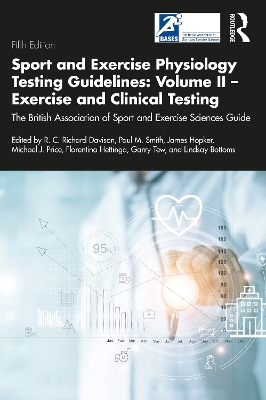
Sport and Exercise Physiology Testing Guidelines: Volume II - Exercise and Clinical Testing
Routledge (Verlag)
9780367489847 (ISBN)
Since its first published edition more than 30 years ago, the BASES (British Association of Sport and Exercise Sciences) Physiological Testing Guidelines have represented the leading knowledge base of current testing methodology for sport and exercise scientists. Sport and exercise physiologists conduct physiological assessments that have proven validity and reliability, both in laboratory and sport-specific contexts. A wide variety of test protocols have been developed, adapted and refined to support athletes of all abilities reach their full potential. This book is a comprehensive guide to these protocols and to the key issues relating to physiological testing.
With contributions from leading specialist sport physiologists and covering a wide range of mainstream sports in terms of ethical, practical and methodological issues, this volume represents an essential resource for sport-specific exercise testing in both research and applied settings. This new edition draws on the authors’ experience of supporting athletes from many sports through several Olympic cycles to achieve world leading performances. While drawing on previous editions, it is presented in a revised format matching the sport groupings used in elite sport support within the UK sport institutes. Building on the underpinning general procedures, these specific chapters are supported by appropriate up-to-date case studies in the supporting web resources.
R.C. Richard Davison, PhD, FBASES, CSci, is Professor of Exercise Physiology in the School of Health and Life Sciences at the University of the West of Scotland, UK. Paul M. Smith, PhD, FBASES, FHEA, is Senior Lecturer in Exercise Physiology in the School of Sport and Health Sciences at Cardiff Metropolitan University, UK. James Hopker, PhD, is Professor of Sport and Exercise Science and Deputy Director of the Division of Natural Sciences at the University of Kent, UK. Michael J. Price, PhD, FBASES, is Reader in Exercise Physiology at Coventry University, UK. Florentina Hettinga, PhD, FACSM, FECSS, SFHEA, is Professor of Sport, Exercise and Rehabilitation and Director of Research and Knowledge Exchange of the Department of Sport, Exercise and Rehabilitation at Northumbria University, UK. Garry Tew, PhD, FBASES, FHEA, is Professor of Clinical Exercise Science in the Department of Sport, Exercise and Rehabilitation at Northumbria University, UK. Lindsay Bottoms, PhD, FBASES, is Reader in Exercise and Health Physiology at the University of Hertfordshire, UK, and the Director of the Research Centre for Psychology and Sports Sciences.
Introduction
Part 1
1.1 Professional Competency and Working with Others
1.2: Physiological Exercise Testing: Ethical Considerations
1.3: Health and Safety in Duty of Care: Evaluating and Stratifying Risk
1.4: Safeguarding in Physiological Testing
1.5: Influence of Medication on Typical Exercise Response
Part 2
2.1: Data Intelligence and Feedback in a Clinical Context
2.2: Reliability and Measurement Error
2.3 Scaling: Adjusting Physiological and Performance Measures to Body Size
Part 3
3.1: Participant Pre-test Preparation and Evaluation
3.2: Maintenance and Calibration Standards: A Cornerstone of Laboratory Quality Assurance
3.3: Lung and Respiratory Muscle Function
3.4: Surface Anthropometry
3.5: Functional Screening
3.6: Assessment of Free-living Energy Expenditure
3.7: Respiratory Gas Analysis
3.8: Metabolic Threshold Testing: Interpretation and Prognostic Prescriptive Value
3.9: Ratings of Perceived Exertion
3.10: Clinical Strength Testing
3.11: Blood Sampling
3.12: Field Based Assessments for Determining Aerobic Fitness and Exercise Prescription
3.13: Quantifying Free-living Physical Activity and Sedentary Behaviours in Adults
3.14: Musculoskeletal Assessment
Part 4
4.1: Assessment of Peripheral Blood Flow and Vascular Function
4.2: Application of Dual Energy X-ray Absorptiometry
4.3: Assessment of Cardiac Structure and Function
4.4: Methods in Exercise Immunology
4.5: Skeletal Muscle Biopsy: Techniques and Applications
Part 5
5.1: Exercise Testing in Obesity
5.2: Exercise Testing in Cardiovascular Disease
5.3: Exercise Testing in Diabetes
5.4: Exercise Testing in Chronic Kidney Disease
5.5: Exercise Testing in Chronic Lung Disease
5.6: Exercise Testing in Breast and Prostate Cancer
5.7: Exercise Testing in Peripheral Arterial Disease
5.8: Exercise Testing in Children
5.9: Exercise Testing in Older Adults
5.10: Exercise Testing in Females
5.11: Exercise Testing in Pregnancy
5.12: Exercise Testing in Heart Failure
| Erscheinungsdatum | 15.03.2022 |
|---|---|
| Zusatzinfo | 12 Tables, color; 10 Tables, black and white; 9 Line drawings, color; 9 Line drawings, black and white; 3 Halftones, color; 9 Halftones, black and white; 12 Illustrations, color; 18 Illustrations, black and white |
| Verlagsort | London |
| Sprache | englisch |
| Maße | 156 x 234 mm |
| Gewicht | 560 g |
| Themenwelt | Sachbuch/Ratgeber ► Sport |
| Medizin / Pharmazie ► Physiotherapie / Ergotherapie ► Rehabilitation | |
| Studium ► 1. Studienabschnitt (Vorklinik) ► Physiologie | |
| ISBN-13 | 9780367489847 / 9780367489847 |
| Zustand | Neuware |
| Informationen gemäß Produktsicherheitsverordnung (GPSR) | |
| Haben Sie eine Frage zum Produkt? |
aus dem Bereich


